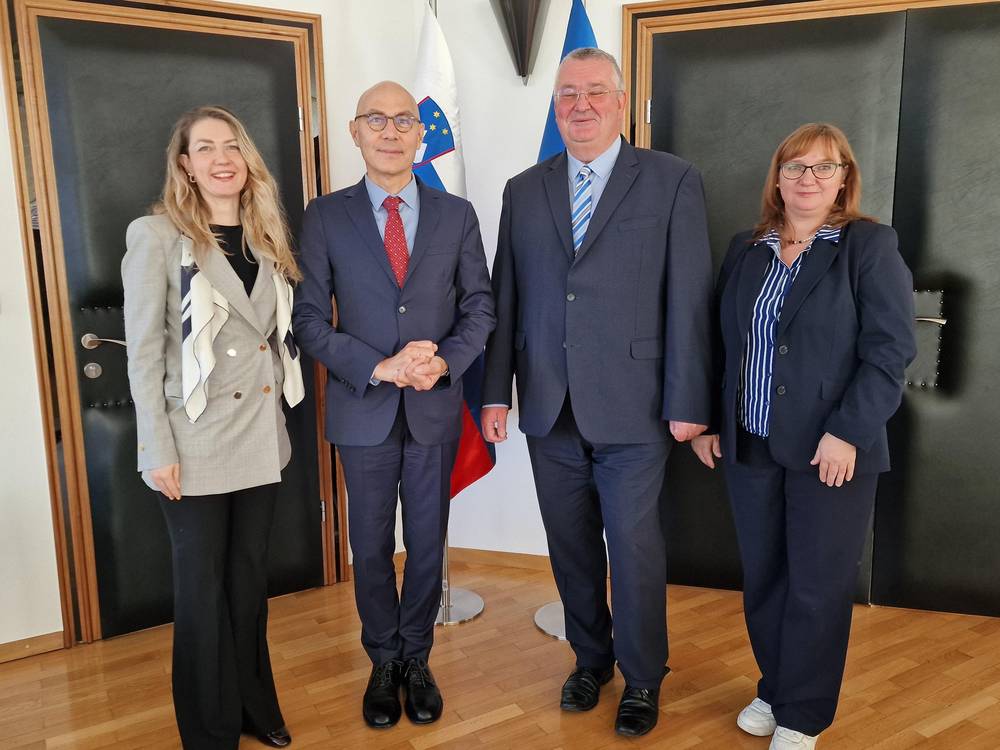On 8 October 2025, the Human Rights Ombudsman of the Republic of Slovenia (Ombudsman) hosted Volker Türk, the United Nations High Commissioner for Human Rights. The Commissioner is visiting Slovenia as part of a working meeting dedicated to the situation of human rights and the functioning of independent institutions. The Commissioner was welcomed by Deputy Ombudsman Ivan Šelih and Dr Simona Drenik Bavdek, Assistant Head of the Center for Human Rights. They informed the Commissioner about the Ombudsman’s work, its contribution to international human rights protection mechanisms, and the main challenges in the field of human rights protection in Slovenia.
Deputy Ombudsman Šelih, First Acting Head of the Ombudsman’s Office, emphasised the importance of the institution obtaining “A” status accreditation under the Paris Principles in 2021 and noted that the next re-accreditation is scheduled for 2026. He warned that the prolonged failure to appoint the head of the institution could jeopardise this status, as the position has remained vacant for more than seven months. The Deputy Ombudsman also informed the guest about the activities of the National Preventive Mechanism, while Dr Simona Drenik Bavdek, Assistant Head, presented the work of the Center for Human Rights.
In the discussion, both representatives of the Ombudsman noted the failure to implement decisions of the Constitutional Court of Slovenia, highlighting that approximately 120 recommendations issued by the Ombudsman remain unimplemented. Among them, the call for introducing mandatory human rights impact assessments in the legislative process stands out, as it would enable a more systematic and preventive protection of human rights. The Ombudsman representatives also drew attention to the fragmented response of the state and the insufficient cooperation between ministries, both of which hinder the introduction of necessary systemic changes and perpetuate patterns of ineffective problem-solving. The Ombudsman also advocates for the development of legislation that would better connect the areas of business and human rights.
The discussion also highlighted the lack of systematic monitoring of the recommendations issued by the UN Committees. Slovenia has yet to establish an independent mechanism for monitoring the implementation of the CRPD, has not appointed a national rapporteur for human trafficking, and has not ratified the Optional Protocol to the International Covenant on Economic, Social and Cultural Rights. The latter received particular attention from the participants. The discussion also highlighted the lack of disaggregated data, which prevents the adoption of appropriate measures to effectively protect the rights of specific groups, including Roma.
The participants also addressed challenges in the judiciary and the rule of law. They noted prolonged administrative court proceedings and delays in family court decisions due to a shortage of court experts. Prison facilities are experiencing a shortage of personnel, which gives rise to certain security risks. The Ombudsman has also noted an expansion of alternatives to imprisonment. Šelih and Dr Drenik Bavdek cited the judgement of the European Court of Human Rights in the Case of X and Others v. Slovenia, in which the Court endorsed the Ombudsman’s position regarding the infringement of the right to a lawful judge and thereby affirmed the Ombudsman’s role in upholding the rule of law. The discussion also highlighted the importance of protecting human rights defenders, particularly with regard to SLAPP lawsuits.
In the areas of health, social security, and the rights of persons with disabilities, the discussion emphasised serious systemic problems that directly affect people’s quality of life. Among these issues, a shortage of staff in social welfare centres is hindering the fulfilment of individuals’ social rights, while shortages in healthcare personnel are causing patients to face excessively long waiting times. Delays in issuing decisions on sick leave and disability further undermine individuals’ sense of social security and their trust in institutions. The process of deinstitutionalisation is progressing too slowly, many public facilities remain poorly accessible to persons with various types of disabilities, and the Slovenian definition of disability is still not aligned with the social model established by the Convention on the Rights of Persons with Disabilities (CRPD).
The institution’s representatives also informed the Commissioner about the insufficient public participation in the legislative process and numerous unresolved issues concerning the environment and spatial planning. Among other points, they noted that the constitutional right to access drinking water still lacks appropriate sectoral legislation.
High Commissioner Türk thanked the Ombudsman’s institution for its engagement in international bodies and emphasised the importance of social rights, including the ratification of the Optional Protocol to the International Covenant on Economic, Social and Cultural Rights, particularly in light of the Slovenian candidacy for the UN Human Rights Council. He also highlighted the importance of ensuring sufficient budgetary resources for the implementation of human rights. The High Commissioner’s visit was important for strengthening Slovenia’s role in the international human rights protection network and for reaffirming the Human Rights Ombudsman as a key institution in fulfilling the state’s international commitments.

![[Translate to English:] Visoki komisar Turk in namestnik varuha Šelih s sodelavkama](/fileadmin/_processed_/4/c/csm_2025_10_8__Volker_Turk_pri_Varuhu_3_b963ebadd3.jpg)
![[Translate to English:] Volker Türk in Ivan Šelih stojita pred slovensko in evropsko zastavo](/fileadmin/_processed_/e/8/csm_2025_10_8__Volker_Turk_pri_Varuhu_2a_324ca34cab.jpg)
![[Translate to English:] Udeleženci srečanja med pogovorom](/fileadmin/_processed_/1/e/csm_2025_10_8__Volker_Turk_pri_Varuhu_4a_8683f067d4.jpg)